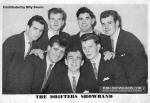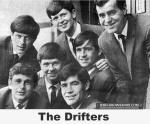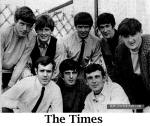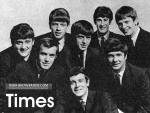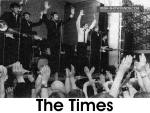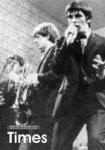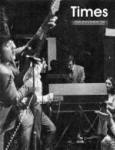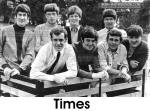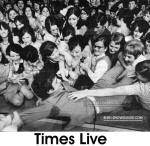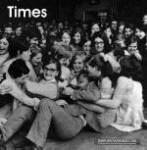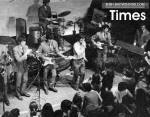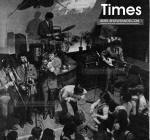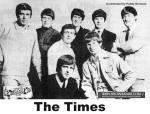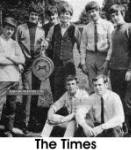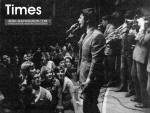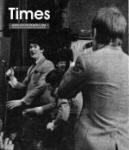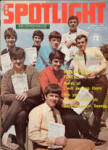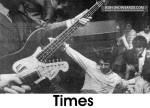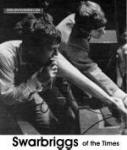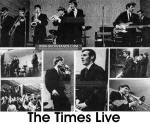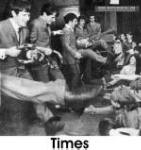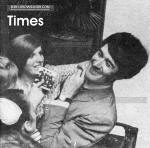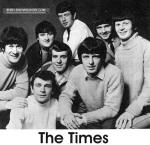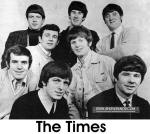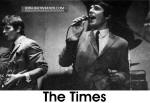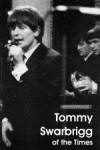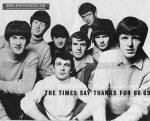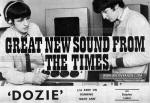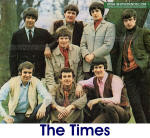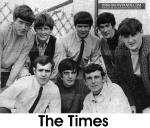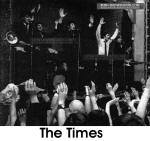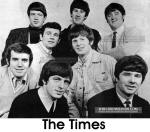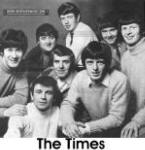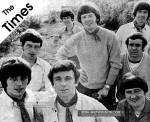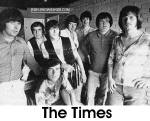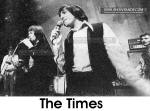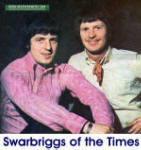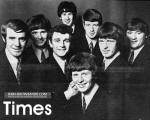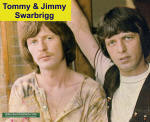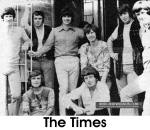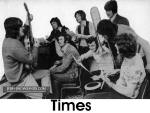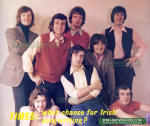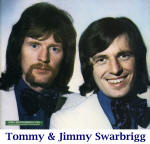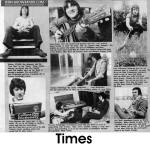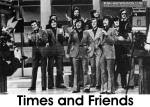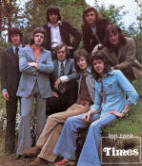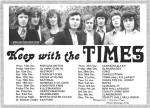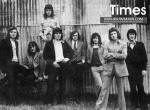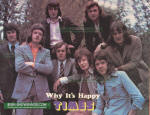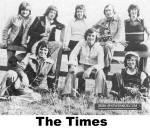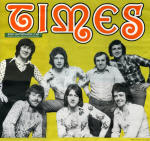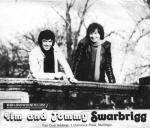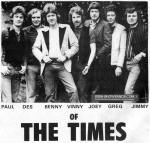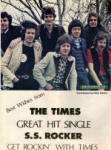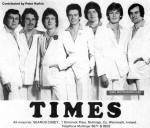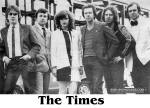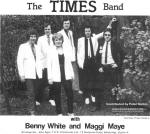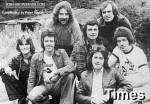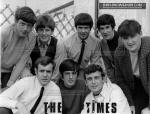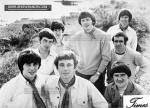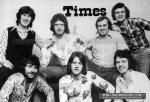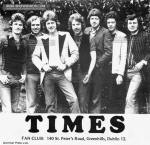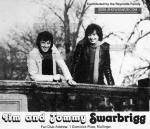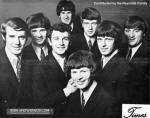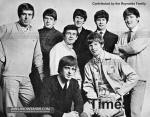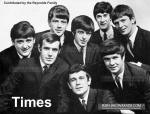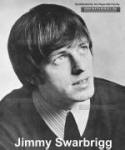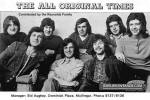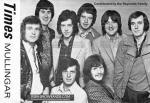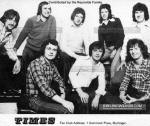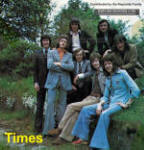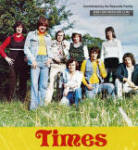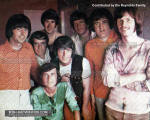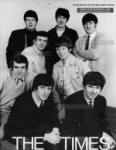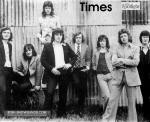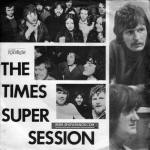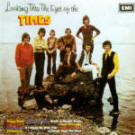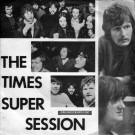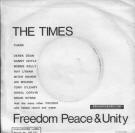The Times (1968-1982)
Photo Gallery -
Band Lineups -
Discography
- Audio samples -
Where Are They Now?
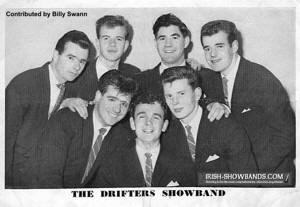 The Story
The Story
In
1964, two brothers, Joe and Ben Dolan, put together a band that would help shape
Irish pop music for the next decade and beyond.
The brothers knew they could make a go of music and quit their day jobs (Ben as
a carpenter and Joe as a compositor) and formed The Drifters in 1964 with Ben on
Sax and Joe as guitarist
and lead singer. The other members of the band were: Sid Aughey
(drums), Jimmy Horan (bass), Tommy Swarbrigg (trumpet), Joey
Gilheaney (trombone), and Des Doherty (keyboards). The band's first record was an an old Del Shannon
song, "The Answer To Everything," which went to No. 4 in the Irish
Charts.
The story
of Joe Dolan is well known and documented on this site on our
feature on The Drifters, but this is the
story of the "other" five lads in the band. For almost five years,
The Drifters Showband enjoyed enormous success on the Irish charts
and in the ballrooms. Joe Dolan (still the band's guitarist) was
enjoying a fast rise to the top of the Irish entertainment scene in
the mid sixties.
However, it was at a point when the band was possibly at it's
highest point in the sixties, that the five "non-Dolan" members
decided it was time to break away and strike out on their own.
Although it might seem strange looking back for a band to split up
at the height of it's popularity, it was not uncommon on the
showband scene. Defections were numerous as bands struggled to find
their identity. The Miami parted company with Dickie Rock, Brendan
Bowyer and Tom Dunphy left the Royal Showband to form the Big 8, Joe
McCarthy and Brendan O'Brien left the Dixies to form Stage 2, Billy
Brown defected from the Freshmen to form Brown and O'Brien, Brian
Coll split from the Plattermen, and the list went on and on.
Perhaps the
greatest influence on these breakups was the perceived "aging" of
the showband stars. Many of the singers who were on the road in the
early sixties, like Bowyer, Dolan and Rock were beginning to look
"old" to a new generation of dancers that flocked to the halls in
the late sixties. These dancers had grown up watching the Beatles
shed their suits and embrace flower power and showbands that
strutted the stage in matching suits wasn't cutting it any more. It
was also at this time that the big "split" in the showband scene was
occurring. Previous bands had played everything and been all things
to all people, but as the sixties closed, more and more bands were
declaring themselves as either pop or country outfits. Strangely
enough, it would be the country bands that won out in the end, but
that's another story.
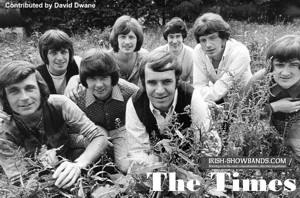 It
was in mid
1968, that Tommy Swarbrigg and the younger members
of the band decided it was
time for a change in direction and they left the Drifters to form The Times.
Since the five musicians had been playing together for so long, all
they needed were replacements for Joe and Ben and they were ready to
hit the road. Tommy contacted his brother, Jimmy, who was
living in London, and he returned to front the new pop band, leaving Joe and Ben alone.
To round out the new lineup, they recruited Sean Kenny on guitar (he
had previously been with the Hi-Lows) and
Gene Bannon (from the Millionaires showband) on sax and hit the road without missing a beat.
It
was in mid
1968, that Tommy Swarbrigg and the younger members
of the band decided it was
time for a change in direction and they left the Drifters to form The Times.
Since the five musicians had been playing together for so long, all
they needed were replacements for Joe and Ben and they were ready to
hit the road. Tommy contacted his brother, Jimmy, who was
living in London, and he returned to front the new pop band, leaving Joe and Ben alone.
To round out the new lineup, they recruited Sean Kenny on guitar (he
had previously been with the Hi-Lows) and
Gene Bannon (from the Millionaires showband) on sax and hit the road without missing a beat.
The band
played their first gig in the Ierne Ballroom in Dublin on
Saturday, August 17th. In an interview in the August 24th issue of
Spotlight, Tommy accepted that many people blamed the breakaway
members of the Drifters for causing the split. He added, "there was
also the question of finance. We felt that we should be getting a
greater share of the money that was being made." The new outfit was
managed by the Tom Costello Organization. However, it was
reported in Spotlight on March 15th, 1969 that Greg Hughes would be
taking over management of the Times.
Before
long, Sid Aughey gave up playing the drums to take over managing the
new band and was replaced by Micky O'Neill (who joined the Big 8 in
1971) and eventually Greg Donaghey. This would be the only
change in the lineup for many years.
At first,
the band was an average pop band, in Jimmy's words in a 1975
interview in Spotlight, "like everybody else, we brought out
a few singles - cover versions of other people's hits. Well, they
flopped so we thought: we've nothing to lose if we record some of
our own songs and we felt it'd be more fun anyway." There first self
penned release, Hitching to Miami which Jimmy said, "was
based on Woodstock," got the band some notice and reached number 7
in the Irish charts.
Soon, the Swarbrigg brothers began to distinguish themselves
from the vast majority of bands in the country by writing their own
material. They enjoyed a string of self penned hit records as the
70's progressed. In 1973 they had their own television show on RTE,
which allowed the Swarbriggs to showcase their original songs. The
band enjoyed a reputation, along with the likes of the Freshmen, of
being one of the true "original" pop bands in Ireland.
They also hooked up with British singing star, Hurricane Smith (Oh
Babe, What Would You Say) as he helped produce several of their
singles.
As the
popularity and the success of the Swarbriggs continued to grow, in
the the tradition of the Irish showbands, the future of The Times
became more and more in doubt. In 1975 the Swarbriggs represented Ireland in Eurovision with
"That's What Friends Are For." In 1976, they came 5th in the Irish
contest with "The Way of Love." In 1977, they won the Irish national
Song Contest again with "It's Nice To Be In Love Again" as The
Swarbriggs plus Two (Alma Carroll and Nicola Kerr).
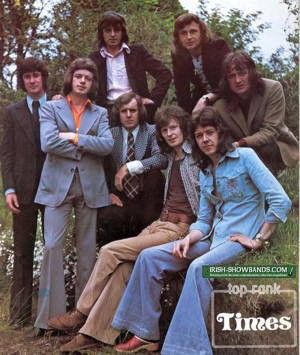 Finally,
the Swarbriggs did decide to leave and took manager, Sid Aughey, with them.
Also departing was guitarist Sean Kenny, who went with the Swarbriggs before eventually ending up with
Sean O'Dowd and Dingaling in the early 80's. Interestingly enough, Joe Dolan's
manager, Seamus Casey took over managing the
band, bringing them into the same stable as their former band mates,
Joe and Ben Dolan. The Swarbriggs continued to enjoy success with
their own band, and actually changed their name to Winter in 1978
based on a recommendation by their label in England, EMI.
Finally,
the Swarbriggs did decide to leave and took manager, Sid Aughey, with them.
Also departing was guitarist Sean Kenny, who went with the Swarbriggs before eventually ending up with
Sean O'Dowd and Dingaling in the early 80's. Interestingly enough, Joe Dolan's
manager, Seamus Casey took over managing the
band, bringing them into the same stable as their former band mates,
Joe and Ben Dolan. The Swarbriggs continued to enjoy success with
their own band, and actually changed their name to Winter in 1978
based on a recommendation by their label in England, EMI.
Meanwhile,
The Times marched on, adding former Real McCoy member Eddie Campbell
on guitar and vocalist Benny White out front. The lineup would be
relatively should lived as Eddie was soon replaced by Vinnie Baker
and Gene Bannon's sax was replaced by Paul Mitchell's trumpet. Vinny Baker had been with several name outfits
before joining The Times and Benny and Vinny soon became the band's new
songwriters, penning several successful singles over the next few
years.
As the
seventies came to a close, the Times made, perhaps their final major
change, dropping brass from the lineup and adding a female vocalist, Maggie Maye,
who joined them in April, 1980. Jimmy Horan and Des Doherty were the
only remaining members of the original lineup and continued to carry
on the band's name. However, the future for the band would be a
short one as they were gone within two years.
We found the following passage at
Vinny Baker's website:
"The Times split up in 1982 during
the rapid decline in the Showband scene, brought about mainly by the
onslaught of the Disco craze and the complete inability of ballroom
owners to adapt to the changes which dance goers now demanded. Gone
were the days when people were content to socialise in cold, damp,
drab dance halls. And the disco bars and halls were mainly being run
in the comfort of hotel ballrooms, which in general, were not much
better than the dance halls around the country, but had plenty of
dim lighting and flashing lights to disguise the dirt and drabness
in them, so they completely obliterated the dance halls and in the
space of a few years, the halls and ballrooms were closed and remain
closed to this day."
So, as the
industry shifted from ballrooms to hotels in the 80's, more bands
dropped their numbers to five or six piece lineups, thus allowing
them to continue to make money despite the dwindling opportunities
in the industry. The Times finally called it quits in 1982.
In closing,
the musicians who formed the Times played an important role in Irish
popular music: first as the backing band that helped make Joe Dolan
an international star. Then, as a fertile environment in which the
talents of Tommy and Jimmy Swarbrigg flourished, bringing them to
Eurovision. And finally on their own, making their living in the era
that was The Showband Era.
If you have
any additional about the Times or its members,
please email us.
Photo Gallery (click on thumbnail for full image)
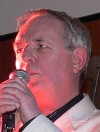 |
Jimmy Swarbrigg:
More to come |
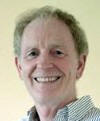 |
Tommy Swarbrigg:
Tommy and brother Jimmy left the Times and formed their own
band which was initially called Winter, a name which did not
stick.
In 1975 the Swarbriggs represented Ireland in Eurovision with
"That's What Friends Are For." In 1976, they came 5th in the Irish
contest with "The Way of Love." In 1977, they won the Irish national
Song Contest again with "It's Nice To Be In Love Again" as The
Swarbriggs plus Two (Alma Carroll and Nicola Kerr). Today, Tommy
has become one of the top music promoters in Ireland,
and runs a variety of events including the
Ronan Collins Showband Show which features many of the top
performers of the showband era. |
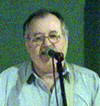 |
Sean Kenny - RIP: Sean, who
had been with the Jivenaires showband, left the Times when
Jimmy and Tommy Swarbrigg departed to form The Swarbrigg's
Band (also to be known as "Winter" for a short while). In
the early 1980's he joined Shaun O'Dowd and Dingaling. Sean
was playing the local pub scene and occasionally reunited
with the Jivenaires up until his death on 9th February, 2011
after a long illness. Our sincere sympathies to his family
and friends. . |
 |
Jimmy Horan: Unknown - if you have info please email us |
 |
Sid Aughey: Sid
stayed on stage until around 1971 when he left to manage the
band. He also managed the fortunes of the Swarbriggs
Brothers through the late 1970's.
Unknown - if you have info please email us |
 |
Des Doherty: Des
"Doc" Doherty, stayed with the band until it folded in the
early 80's. In 2008, we know that he was part of the
Tennessee Country Breakdown band which played regular gigs
in the midlands, although we are unsure whether they are
still going today. Unknown - if you have info please email us |
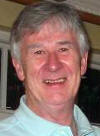 |
Gene Bannon: These
days, Gene runs his own pub in Cootehill appropriately named
Bannon's. He also plays regularly with his own jazz band,
usually in the pub, but also for local functions and gigs
across the region.
If you have more info please email us |
 |
Joey Gilheany - RIP:
Like the others, Joel left the Drifters in 1968 to form the
Times which he stayed with until around 1979 when the Times
reduced their numbers from a six piece to five piece. After
Joey left the showband scene his daughter, Meabh, has told
us he continued to play with a variety of bands and
concerts. He went to live in London for some time before
returning to Ireland. Joey sadly passed away February 1, 2022 |
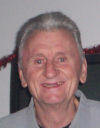 |
Mickey O'Neill - RIP:
Mickey once wrote us: I was looking at your website
(Capitol Showband) and saw that you wanted updated info on
me (Mickey O'Neill). I've lived in Las Vegas for the
past 25 years and was the drummer with Brendan Bowyer's
Royal Irish (known in Ireland as the Big Eight). I'm
retired, but still play some gigs with Michael Keane, Jimmy
Conway and D.J.Curtin (from the Big Eight and Kerry Blues).
Mickey lives in Vegas with his longtime partner Mary Schwartz
with his two sons Alan and Mark. Sadly Mickey lost his other
son, Michael in 2005 as a result of a car accident at the
age of 21. Further to this listing, Mickey sadly passed away
on June 15, 2010. A friend to the site before his death, our
sincere sympathies go out to his family and friends in
Ireland and the USA. |
 |
Greg Donaghey: Unknown - if you have info please email us |
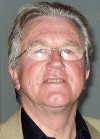 |
Benny White: Around
1982, The Times called it quits and Benny tells us he took a
break until 1986 when he formed a band with Jimmy Slevin,
Greg Donaghy, and Jack Costello called Male Order and
played for a short while until Jimmy moved to Germany. Jimmy
and Benny had also been part of a recording group called
Steal Moon before Male Order. They made two
records, "The Mainstream" and "The Landlord." In the 1990's,
Benny did a lot of gigging in the United States and
Tenerife. These days he plays the odd gig with Terry
Merrick (Others) and Maxie McEvoy (Strangers) as well as
doing some solo work. |
 |
Vinnie Baker - RIP:
In 1982, Vinny quit the business
and took a job in a factory and stopped playing guitar for
about 4 years. He got back into playing when he started
teaching his son and was soon into recording trying to have
his own songs demo'd. The recording bug took Vinny and he
was soon the owner of a new recording studio with a live
recording room that doubles as a classroom to do guitar
lessons in. He released his first solo album, 'So', in 2003
and he continued to play and record regularly with the
Tennessee Country Breakdown Band, along with other groups
throughout the Midlands and across the country until his
death. Sadly, Vinnie died very suddenly on the 20th of July,
2013. Our sympathies are extended to his family and friends.
|
 |
Paul Mitchell: Unknown - if you have info please email us |
 |
Maggie Maye: Unknown - if you have info please email us |

 The Story
The Story It
was in mid
1968, that Tommy Swarbrigg and the younger members
of the band decided it was
time for a change in direction and they left the Drifters to form The Times.
Since the five musicians had been playing together for so long, all
they needed were replacements for Joe and Ben and they were ready to
hit the road. Tommy contacted his brother, Jimmy, who was
living in London, and he returned to front the new pop band, leaving Joe and Ben alone.
To round out the new lineup, they recruited Sean Kenny on guitar (he
had previously been with the Hi-Lows) and
Gene Bannon (from the Millionaires showband) on sax and hit the road without missing a beat.
It
was in mid
1968, that Tommy Swarbrigg and the younger members
of the band decided it was
time for a change in direction and they left the Drifters to form The Times.
Since the five musicians had been playing together for so long, all
they needed were replacements for Joe and Ben and they were ready to
hit the road. Tommy contacted his brother, Jimmy, who was
living in London, and he returned to front the new pop band, leaving Joe and Ben alone.
To round out the new lineup, they recruited Sean Kenny on guitar (he
had previously been with the Hi-Lows) and
Gene Bannon (from the Millionaires showband) on sax and hit the road without missing a beat. Finally,
the Swarbriggs did decide to leave and took manager, Sid Aughey, with them.
Also departing was guitarist Sean Kenny, who went with the Swarbriggs before eventually ending up with
Sean O'Dowd and Dingaling in the early 80's. Interestingly enough, Joe Dolan's
manager, Seamus Casey took over managing the
band, bringing them into the same stable as their former band mates,
Joe and Ben Dolan. The Swarbriggs continued to enjoy success with
their own band, and actually changed their name to Winter in 1978
based on a recommendation by their label in England, EMI.
Finally,
the Swarbriggs did decide to leave and took manager, Sid Aughey, with them.
Also departing was guitarist Sean Kenny, who went with the Swarbriggs before eventually ending up with
Sean O'Dowd and Dingaling in the early 80's. Interestingly enough, Joe Dolan's
manager, Seamus Casey took over managing the
band, bringing them into the same stable as their former band mates,
Joe and Ben Dolan. The Swarbriggs continued to enjoy success with
their own band, and actually changed their name to Winter in 1978
based on a recommendation by their label in England, EMI.